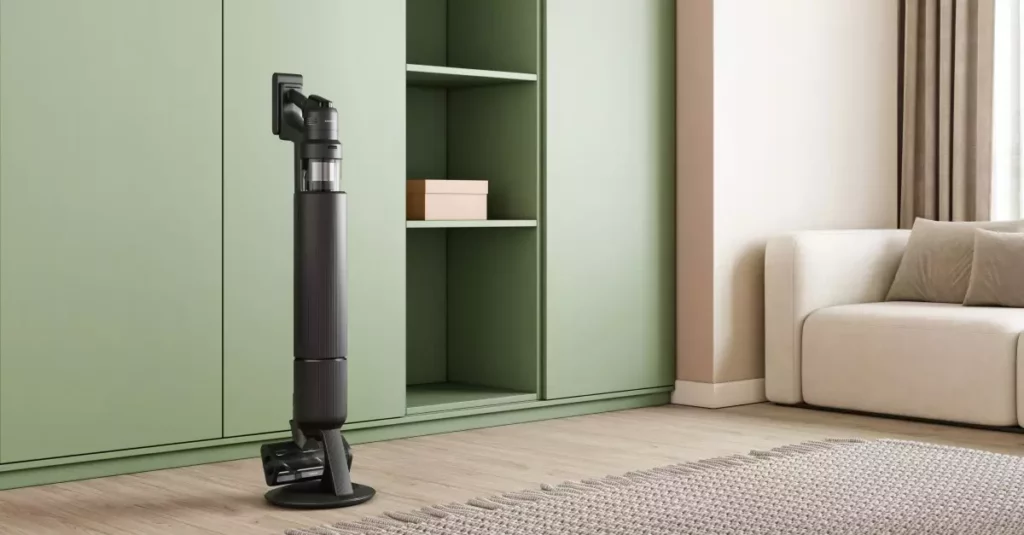Samsung has always been at the forefront of technological advancement, and their latest offerings in the realm of smart home appliances are no exception. With the launch of their Bespoke AI line—featuring high-tech devices like cordless vacuum cleaners and washer-dryer combos—Samsung aims to redefine home dynamics. However, as impressive as these innovations may appear at first glance, it’s essential to scrutinize whether they truly enhance our lives or if they are merely gilded distractions. The allure of a tech-savvy home can be tempting, but does it come at a cost to our well-being and privacy?
The Smart Appliance Dilemma
Let’s take a closer look at Samsung’s Bespoke AI Jet Ultra vacuum. With its eye-catching LCD display designed to alert users of incoming messages or calls during chores, one might argue that this integration is the epitome of convenience. Priced at $1,099, the vacuum provides not only excellent suction but also a generous 100-minute battery life. Yet, one has to wonder: is it truly necessary to have these notifications when we could merely check our phones at our convenience? The inherent distraction from housekeeping tasks raises questions about our attention spans and the essence of multitasking itself. It appears that while technology aims to simplify our lives, it may inadvertently complicate the very nature of these household tasks.
Innovative or Overly Intrusive?
The Bespoke AI Laundry Vented Combo washer and dryer juxtaposes efficiency with practicality. Retailing at $3,099, this appliance boasts a 7-inch touchscreen that allows not only washing but also the ability to take calls mid-laundry—a perplexing feature indeed. Folding clothes while participating in a professional call is a scenario you might envision as the hallmark of multitasking. However, can the pressure of constant connectivity be deemed beneficial? I question whether we are sacrificing our ability to immerse ourselves in a single task for the false allure of being constantly ‘on.’ The beauty of household activities lies in their simplicity; must they morph into a digital circus?
Efficiency or Superfluous Complexity?
Samsung’s AI Home initiative aims to create seamless interaction among devices, allowing families to explore recipes via their smart fridge while managing their laundry cycles. While this interconnected ecosystem sounds appealing, it skews toward the idea that more technology equates to greater convenience. I find this perspective problematic; it risks rendering home tasks not just complicated but utterly overwhelming. With screens embedded in every device, we run the risk of technological obsolescence—where a simple component, such as a knob, could outlast an integrated screen burdened with constantly evolving software. Can we truly attribute advancement to perpetual upgrades that may quickly become obsolete, leaving users with useless technology?
Privacy Concerns in a Trusted Space
One cannot sidestep the looming question of privacy that arises with the introduction of smart appliances. The convenience of having every appliance interconnected raises red flags about data mining and surveillance in our most intimate spaces. While Samsung has yet to cross this line, one must evaluate the risks associated with potential intrusions. History has shown that many tech companies will not hesitate to implement advertisements directly into our homes. The point of investing in smart technology should be to enhance comfort and security, not to compromise our sanctuary.
A Balancing Act of Smart Homes
As Samsung champions innovations designed to revolutionize user-friendly living, the burning question remains: how much technology is genuinely beneficial? There’s an undeniable appeal to having an intelligent home filled with cutting-edge gadgets, but at what point does the ‘smart’ become an unwieldy burden? The delicate balance between intelligent functionality and unnecessary complexity is one we must tread carefully.
In an era where the distractions of technology can easily overwhelm our daily lives, brands must prioritize not just the flashiness of devices, but the thoughtful integration of technology that enhances rather than diminishes our quality of life. If we allow ourselves to be swept up in the aesthetics of modern living without considering the implications, we risk turning our homes into cramped tech jungles rather than sanctuaries of comfort and peace. Perhaps the greatest challenge is finding a way to embrace the future without sacrificing the very essence of what makes a home—simple joys and meaningful interactions.









Leave a Reply